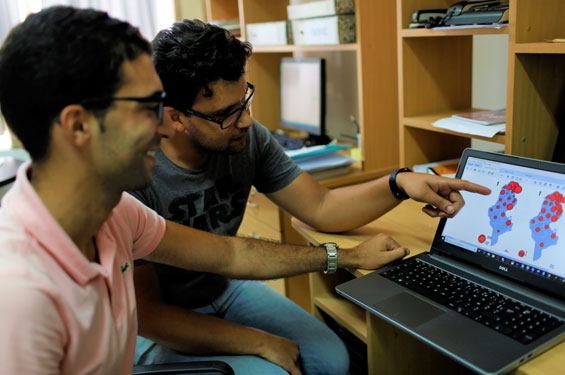 Biostatistician Elyes Boutouria (l) and epidemiologist Wassim Zaatour review Tunisia’s map of influenza sentinel sites at the national observatory for new and emerging diseases
Biostatistician Elyes Boutouria (l) and epidemiologist Wassim Zaatour review Tunisia’s map of influenza sentinel sites at the national observatory for new and emerging diseases
Photo: Simon van Woerden/WHO
15 August 2018 - From 13 to 15 August, public health experts from five countries gathered in Tunis, to develop a planning tool for creating and updating national plans for pandemic influenza preparedness. It was the first time two WHO Regional Offices (the Office for the Eastern Mediterranean Region, or EMRO, and the one for the African Region, or AFRO) worked together on organizing a workshop on a key public health issue.
In the workshop, Ministry of Health staff from Morocco, Tunisia, Oman, Tanzania and Ghana joined experts from WHO to develop an action planning tool, which allows countries to identify gaps in their National Pandemic Influenza Preparedness Plans. The tool is being developed in accordance with the Pandemic Influenza Preparedness checklist and other WHO guidance for national pandemic influenza preparedness plans.
One dimension of the exercise focused on surveillance. At the nearby Tunisian observatory for new and emerging diseases, or "Observatoire National des Maladies Nouvelles et Émergentes" (ONMNE), the gathering and analyzing of surveillance data about influenza and other pandemic- and epidemic-prone diseases is everyday business. President of the ONMNE, Dr Nissaf Bouafif Ben Alaya: “Our main activity is early warning of emerging and re-emerging diseases, like the emergence of H1N1 influenza, which caused a pandemic back in 2009. We follow up on reports of new cases, evaluate the risk, and respond quickly to stop further spread of these diseases.”
WHO supports the Tunisian observatory with technical advice on risk communications and a range of other activities. “This support was key last year, when we saw an unusually severe influenza season in Tunisia,” says Dr Bouafif Ben Alaya. “Instead of the normal ten to 15 deaths, we suddenly had 100 people pass away due to seasonal influenza.”
Additionally, improving Tunisia’s pandemic influenza preparedness plan will be instrumental in ensuring the country is better prepared for severe flu seasons, including pandemics, in the future. Surveillance, investigation and assessment were three of the key topics of review during the three day workshop, along with health services and clinical management; preventing illness in the community and risk communication; maintaining essential services and recovery; and evaluation, testing and revising plans.
At the end of the workshop, the five participating countries had all developed their action planning tool, which will allow them to identify and address gaps in their National Pandemic Influenza Preparedness Plans. Dr Bouafif Ben Alaya: “Our work on influenza, as guided by the plan, will improve early warning in such a way that we can reduce the number of severe cases and unnecessary infections, and finally make sure as few people die from influenza as possible.”



